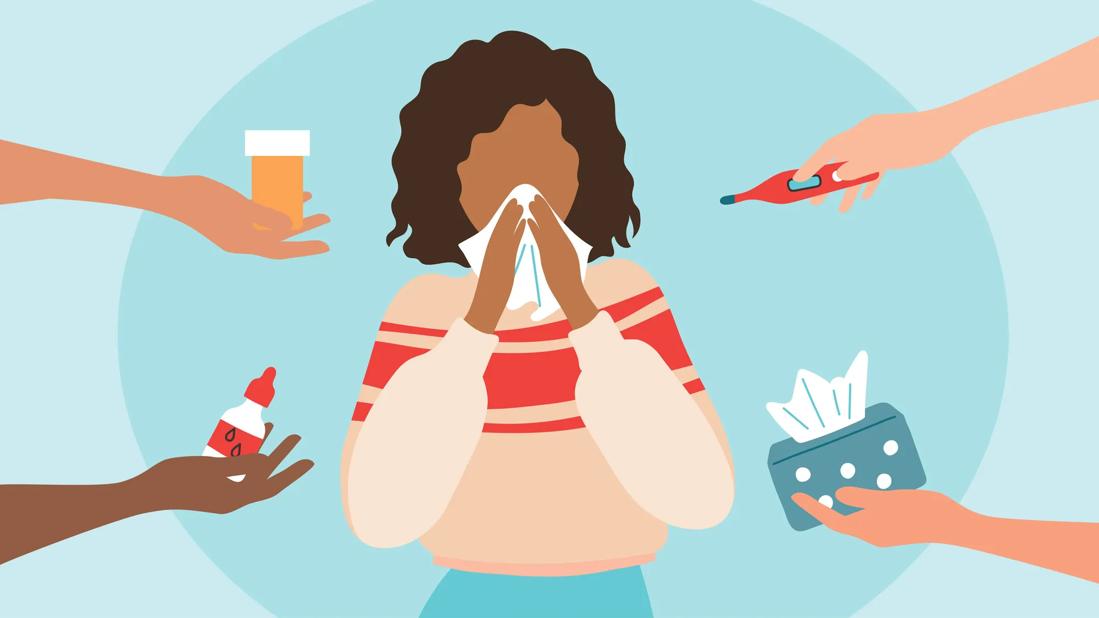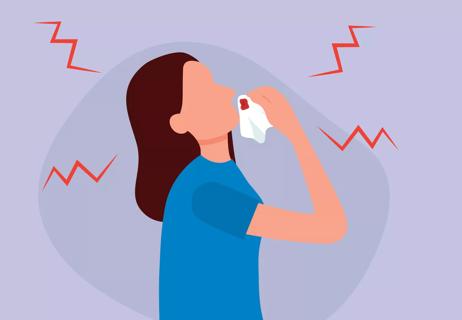If your nose is constantly running, it could be allergies, chronic sinusitis, nasal polyps or other concerns

Some people cling to their emotional support water bottles all day. You? Well, you’ve got your trusty tissue box to tote around.
Advertisement
Cleveland Clinic is a non-profit academic medical center. Advertising on our site helps support our mission. We do not endorse non-Cleveland Clinic products or services. Policy
Runny noses usually come and go. So, why won’t yours go away?
Family medicine physician Josue Limage, MD, explains why your nose is running like a faucet day after day.
Several health conditions — some more serious than others — can make your nose run constantly.
A chronic or long-term runny nose is known as chronic rhinorrhea. Dr. Limage walks us through the most likely causes.
Allergies are the most common reason for a constant runny nose.
They happen when your immune system mistakes a harmless substance, like pollen, dust or pet dander, for a dangerous intruder. Your body responds by bringing on lots of snot to trap the invaders. But that’s not all.
“People with allergies often have other symptoms, such as sneezing, chronic cough, and itchy eyes or throat,” Dr. Limage says.
But, you’re thinking, I’ve never had allergies! It could be time to test that theory.
“Many people are surprised to learn that they can develop allergies in adulthood, including later in life,” he reports.
So, if you’re feeling drippy and have other potential symptoms, an allergy test may be in order.
Nonallergic rhinitis means the lining of your nose is inflamed or irritated by something other than allergies.
Advertisement
“Nonallergic rhinitis feels like allergies because you have clear fluid running out of your nose and you might also have sneezing and congestion,” Dr. Limage says. “But your body isn’t having an allergic reaction. Instead, something is irritating your nasal passages, which can lead to dripping.”
Common triggers include:
Chronic sinusitis is a long-lasting infection of your sinuses.
“Chronic sinusitis is inflammation of the nasal cavity and sinuses that lasts more than 12 weeks,” Dr. Limage explains. “That inflammation can cause a constant runny nose that goes on for months or even years.”
Your provider may recommend a course of antibiotics, steroids or other treatments to resolve chronic sinus infections.
Nasal polyps are noncancerous growths in the lining of your nose or sinuses.
“Nasal polyps can cause increased mucus production in the nose,” says Dr. Limage. “People with nasal polyps can have a constant runny nose, nasal congestion and loss of smell.”
They can be managed with medication for some people. Others may require surgery.
Your adenoids are tiny pieces of tissue in the back of your throat. Adenoids typically start to shrink after age 5 and disappear by adulthood.
Adenoids help keep little kids healthy by boosting their immune system to fight off germs and trapping viruses and bacteria.
But if they’re too big, they can contribute to a chronic runny nose. They can also cause:
If adenoids are causing your nose to run nonstop, your provider may recommend surgery to remove them.
Advertisement
Kids often try putting things in their noses — and sometimes, those things get stuck. It happens.
“If there’s something stuck in your child’s nose, they could have chronic nasal drip,” Dr. Limage confirms.
If something is plugging up your kid’s nostril, it will probably only run on that side. So, see a provider anytime your child has a one-sided runny nose.
If your nose won’t stop running following a head injury or surgery, contact a provider quickly.
Rarely, it can be a sign of a cerebrospinal fluid (CSF) leak. CSF is a watery fluid that surrounds your brain and spinal cord. A layer of tissue holds the fluid inside your head. But if that layer of tissue becomes damaged, fluid can escape, especially after a head injury or sinus surgery.
Left untreated, a CSF leak can lead to meningitis, an infection of your brain and spinal cord. It can be life-threatening.
“CSF has a salty or metallic taste, and it usually drips out of only one side of the nose,” Dr. Limage clarifies. “If you notice one side of your nose dripping after an injury or surgery, get medical care right away.”
Malignant (cancerous) tumors in the nose or sinuses are rare. But when they do happen, they can cause runniness.
“A possible sign of a paranasal tumor is a long-term runny nose on only the affected side,” Dr. Limage says. “Usually, you would also experience other symptoms like pain, headaches or nose bleeds.”
Advertisement
Bottom line? Some chronic runny noses can be stopped with allergy home remedies and antihistamines. Others can be serious signs of infection that should get prompt medical attention. Seek medical care if you have a long-lasting runny nose with:
Finding out the cause — and getting treatment if needed — can help you breathe a little easier, and leave the tissues at home.
Advertisement
Learn more about our editorial process.
Advertisement

Allergies, indigestion and the effects of gravity can all mess with your nose at night

Staying calm, sitting up straight and gently pinching the sides of your nostrils can help a bloody nose go away faster

Dry air, allergies or nose-picking may be to blame for nighttime epistaxis

Take care of your runny or stuffy nose by staying hydrated, using a humidifier and considering a medication

Allergies, acid reflux and even pregnancy can increase drainage and upset your stomach

Seek help if bleeding doesn’t stop or they’re interfering with your life

It’s usually the way your nose manages airflow, but sometimes, it could be other issues

Correct positioning is one of the keys to getting the best results

Wearing a scarf, adjusting your outdoor activities and following your asthma treatment plan can help limit breathing problems

Your diet in the weeks, days and hours ahead of your race can power you to the finish line

When someone guilt trips you, they’re using emotionally manipulative behavior to try to get you to act a certain way